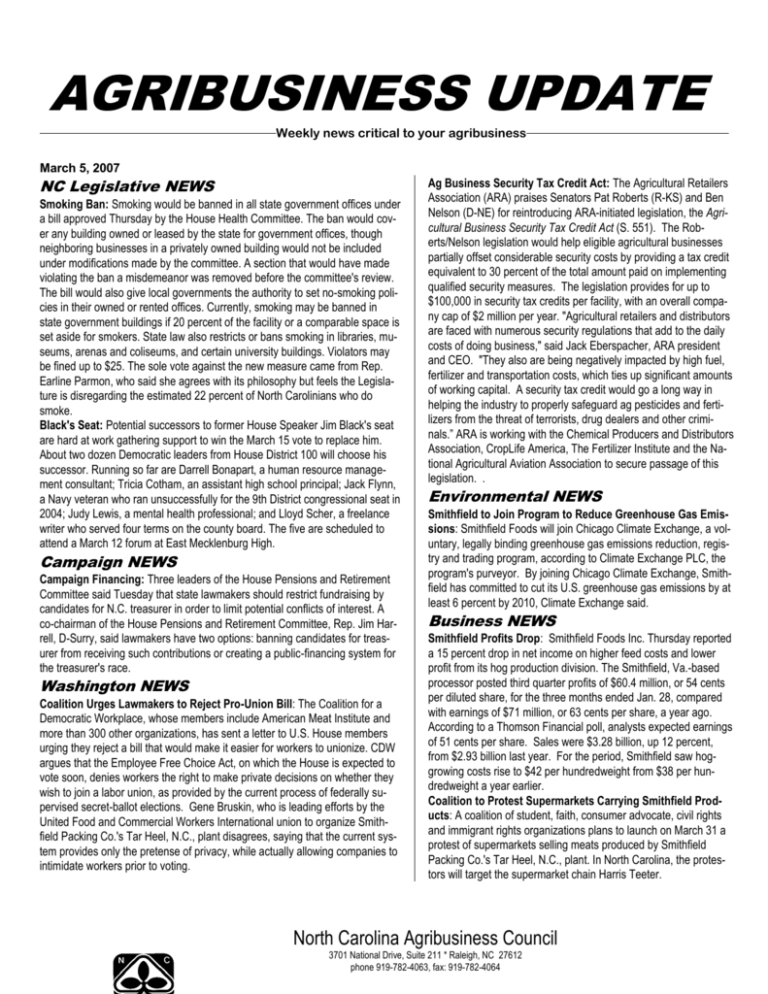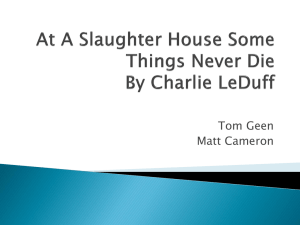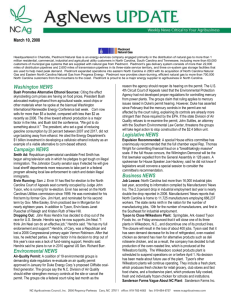AgNews 3-05-07
advertisement

AGRIBUSINESS UPDATE Weekly news critical to your agribusiness March 5, 2007 NC Legislative NEWS Smoking Ban: Smoking would be banned in all state government offices under a bill approved Thursday by the House Health Committee. The ban would cover any building owned or leased by the state for government offices, though neighboring businesses in a privately owned building would not be included under modifications made by the committee. A section that would have made violating the ban a misdemeanor was removed before the committee's review. The bill would also give local governments the authority to set no-smoking policies in their owned or rented offices. Currently, smoking may be banned in state government buildings if 20 percent of the facility or a comparable space is set aside for smokers. State law also restricts or bans smoking in libraries, museums, arenas and coliseums, and certain university buildings. Violators may be fined up to $25. The sole vote against the new measure came from Rep. Earline Parmon, who said she agrees with its philosophy but feels the Legislature is disregarding the estimated 22 percent of North Carolinians who do smoke. Black's Seat: Potential successors to former House Speaker Jim Black's seat are hard at work gathering support to win the March 15 vote to replace him. About two dozen Democratic leaders from House District 100 will choose his successor. Running so far are Darrell Bonapart, a human resource management consultant; Tricia Cotham, an assistant high school principal; Jack Flynn, a Navy veteran who ran unsuccessfully for the 9th District congressional seat in 2004; Judy Lewis, a mental health professional; and Lloyd Scher, a freelance writer who served four terms on the county board. The five are scheduled to attend a March 12 forum at East Mecklenburg High. Campaign NEWS Campaign Financing: Three leaders of the House Pensions and Retirement Committee said Tuesday that state lawmakers should restrict fundraising by candidates for N.C. treasurer in order to limit potential conflicts of interest. A co-chairman of the House Pensions and Retirement Committee, Rep. Jim Harrell, D-Surry, said lawmakers have two options: banning candidates for treasurer from receiving such contributions or creating a public-financing system for the treasurer's race. Washington NEWS Coalition Urges Lawmakers to Reject Pro-Union Bill: The Coalition for a Democratic Workplace, whose members include American Meat Institute and more than 300 other organizations, has sent a letter to U.S. House members urging they reject a bill that would make it easier for workers to unionize. CDW argues that the Employee Free Choice Act, on which the House is expected to vote soon, denies workers the right to make private decisions on whether they wish to join a labor union, as provided by the current process of federally supervised secret-ballot elections. Gene Bruskin, who is leading efforts by the United Food and Commercial Workers International union to organize Smithfield Packing Co.'s Tar Heel, N.C., plant disagrees, saying that the current system provides only the pretense of privacy, while actually allowing companies to intimidate workers prior to voting. Ag Business Security Tax Credit Act: The Agricultural Retailers Association (ARA) praises Senators Pat Roberts (R-KS) and Ben Nelson (D-NE) for reintroducing ARA-initiated legislation, the Agricultural Business Security Tax Credit Act (S. 551). The Roberts/Nelson legislation would help eligible agricultural businesses partially offset considerable security costs by providing a tax credit equivalent to 30 percent of the total amount paid on implementing qualified security measures. The legislation provides for up to $100,000 in security tax credits per facility, with an overall company cap of $2 million per year. "Agricultural retailers and distributors are faced with numerous security regulations that add to the daily costs of doing business," said Jack Eberspacher, ARA president and CEO. "They also are being negatively impacted by high fuel, fertilizer and transportation costs, which ties up significant amounts of working capital. A security tax credit would go a long way in helping the industry to properly safeguard ag pesticides and fertilizers from the threat of terrorists, drug dealers and other criminals.” ARA is working with the Chemical Producers and Distributors Association, CropLife America, The Fertilizer Institute and the National Agricultural Aviation Association to secure passage of this legislation. . Environmental NEWS Smithfield to Join Program to Reduce Greenhouse Gas Emissions: Smithfield Foods will join Chicago Climate Exchange, a voluntary, legally binding greenhouse gas emissions reduction, registry and trading program, according to Climate Exchange PLC, the program's purveyor. By joining Chicago Climate Exchange, Smithfield has committed to cut its U.S. greenhouse gas emissions by at least 6 percent by 2010, Climate Exchange said. Business NEWS Smithfield Profits Drop: Smithfield Foods Inc. Thursday reported a 15 percent drop in net income on higher feed costs and lower profit from its hog production division. The Smithfield, Va.-based processor posted third quarter profits of $60.4 million, or 54 cents per diluted share, for the three months ended Jan. 28, compared with earnings of $71 million, or 63 cents per share, a year ago. According to a Thomson Financial poll, analysts expected earnings of 51 cents per share. Sales were $3.28 billion, up 12 percent, from $2.93 billion last year. For the period, Smithfield saw hoggrowing costs rise to $42 per hundredweight from $38 per hundredweight a year earlier. Coalition to Protest Supermarkets Carrying Smithfield Products: A coalition of student, faith, consumer advocate, civil rights and immigrant rights organizations plans to launch on March 31 a protest of supermarkets selling meats produced by Smithfield Packing Co.'s Tar Heel, N.C., plant. In North Carolina, the protestors will target the supermarket chain Harris Teeter. North Carolina Agribusiness Council 3701 National Drive, Suite 211 * Raleigh, NC 27612 phone 919-782-4063, fax: 919-782-4064 Duke Energy Given OK: The state Utilities Commission has given Duke Energy Corp. permission to build one of the two coal-fired generators it requested for its aging Cliffside facility almost two years ago. One commissioner, Robert V. Owen Jr., dissented from the ruling, saying Duke's application should have been denied in its entirety. The Charlotte-based company said it needs the units in western North Carolina to meet increasing consumer demand, but environmentalists said they would increase pollution already coming from the facility and that Duke failed to fairly explore cleaner power-generating options. The state Division of Air Quality must now decide whether to grant an air quality permit for the project. That permit must also be approved by the federal Environmental Protection Agency. Commodity NEWS Farm Loss: North Carolina lost about 1,000 farms in 2005, continuing a decline that has seen the state lose 300,000 acres of farmland since 2002, according to the U.S. Department of Agriculture. "North Carolina is a leading agricultural state, but losing farms is one category where I don't want us to be No. 1," said Agriculture Commissioner Steve Troxler. North Carolina had 48,000 farms at the beginning of 2006, down from 49,000 a year earlier, according to the USDA. Nationally, the number of farms declined by 8,900 during 2005. Troxler said there could be far-reaching environmental consequences as the open spaces are replaced by houses, buildings and other developments. By 2030, Troxler said, North Carolina is expected add 4million people, making it the 7th most populous state. Troxler said he’s urging the legislature to better fund the Farmland Preservation Trust Fund, which was created in 2005 by the General Assembly to provide money for programs that preserve working farms and protect farmland from development. The fund does not have a dedicated source of funding and is dependent on the legislature for appropriations. Declining Beef Profits: Western North Carolina cattle farmers say recent increases in production costs have hit them hard. "We've seen a real crunch over the last 100 days in western North Carolina -- they're taking off somewhere between $100 to $125 a head for every 500-pound feeder calf," said John Queen, a Haywood County cattleman who was recently elected as the president of the National Cattlemen's Beef Association. An increase in corn prices and other production costs has prompted feed lots that buy calves to cut their costs by offering less per head. Local beef cattle producers from 2000 through the first three quarters of 2006 benefited from a strong national market driven mostly by huge demand and popular protein-oriented diets. Queen said that farmers enjoyed a profit margin of about $150 a head during that time. Profit margins are now closer to their average two-decade value of about $20 a head, Queen said. Pork Exports to Grow in ’07: The U.S. Meat Export Federation projected that U.S. pork exports should increase by 6.2 percent in 2007, with Asia representing much of the growth. Citing concerns over avian influenza and bovine spongiform encephalopathy, USMEF notes that the estimated 6.2 percent jump in 2007 would follow last year's 9 percent rise to a record $2.8 billion. Phil Seng, president and chief executive of USMEF, said the increase should extend pork's record-setting export streak to 15 years. Exports to South Korea are expected to grow 25 percent, Russia 40 percent and Japan by 2 percent. Total 2007 pork exports are projected to be 1,338,000 metric tons, with Japan remaining the No. 1 importer based on value and Mexico leading in volume. Federal Advisers Urge FDA to Approve First AI Vaccine: Federal health advisers on Tuesday recommended that the Food and Drug Administration approve an avian-influenza vaccine despite evidence that the drug would not shield most people from infection. The advisory committee voted that the vaccine was safe and effective, the two conditions that must be met for FDA to approve a drug. FDA officials have said that the Sanofi Aventis SA vaccine could play a role in protecting public health despite its limited effectiveness. Panel member Dr. Robert Couch of the Baylor College of Medicine in Houston ech- oed the claim. "I am of the view that anything is better than nothing," he said just before the vote. In a clinical trial, the two-shot series showed a protective immune response in only 45 percent of adults receiving the highest dose, and FDA has said it would like to see effectiveness in at least 70 percent of those vaccinated. People in the NEWS Standing Pat: House Speaker Joe Hackney said Thursday that Rep. Thomas Wright, D-New Hanover, will keep two key committee assignments as a campaign finance complaint against him is reviewed. Democratic consultant Joe Sinsheimer asked Hackney last week to remove Wright from the committee roles while the State Board of Elections examines Wright's campaign finance reports for the first three quarters of 2006. Wright is chairman of the House Health Committee and a leader on the House Appropriations Committee. In a prepared statement, Hackney said Wright would keep the assignments for now. Hackney, who didn't comment on details of Sinsheimer's letter, said the board was still reviewing the complaint. Utilities Nominations: Gov. Mike Easley, who last week stirred up environmentalists with his nomination of Raleigh utilities lawyer Edward Finley to the state Utilities Commission, has moved quickly to quell the opposition by performing an ideological balancing act. One day after 17 environmental groups called on the legislature to block Finley’s nomination, Easley renominated Sam J. “Jimmy” Ervin IV to a second term on the commission. When he was first nominated in the 1990s, Ervin was strongly opposed by the power companies. They claimed that Ervin, the grandson of former U.S. Sen. Sam J. Ervin Jr., had spent his law career opposing power company rate increase requests. Easley can now go to the legislature and sell Finley and Ervin as a package -- something for the power companies and something for consumers. USDA News Cattle Inventory, Feed Lot Activity Down: Severe weather and rising feed costs delivered a one-two sucker punch to U.S. cattle inventory in January, and also accounted for a significant decrease in the number of cattle placed in feedlots during the same period, according to data from USDA On a monthly basis, Feb. 1 marked the first time cattle and calves on feed for slaughter in U.S. feedlots with capacity of 1,000 head or more were below year-earlier levels since October 2005. The 3 percent drop was the largest year-overyear fall since 2003. Placements in feedlots during January totaled 1.69 million, 23 percent below 2006 and 10 percent below 2005. Net placements were 1.59 million head, which is the second-lowest placement for the month of January since USDA began keeping cattle-on-feed records in 1996. Mark Your Calendar AgForum with Butterfield – NC Agribusiness Council members are invited to attend an Agribusiness Forum with Congressman G.K. Butterfield on March 30 at 11:30 am at the Tobacco Farm Life Museum in Kenly, NC. RSVP is required – seats are limited. Contact the Council at 919-782-4063 for ticket information. House Committee on Environment and Natural Resources will meet on Tuesday, March 6 at 12:00 p.m., 643 Legislative Office Building. Religious leaders will rally on Wednesday, March 7 at 11 a.m. to call for reforms to eliminate farm worker deaths in North Carolina fields, Nash Square Park, 200 W. Hargett St., Raleigh. North Carolina Agribusiness Council 3701 National Drive, Suite 211 * Raleigh, NC 27612 phone 919-782-4063, fax: 919-782-4064









